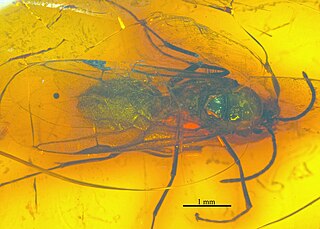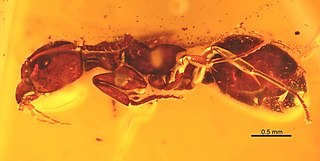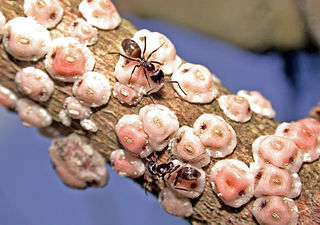
Dolichoderinae is a subfamily of ants, which includes species such as the Argentine ant, the erratic ant, the odorous house ant, and the cone ant. The subfamily presents a great diversity of species throughout the world, distributed in different biogeographic regions, from the Palearctic, Nearctic, Afrotropical region and Malaysia, to the Middle East, Australian, and Neotropical regions.

Dolichoderus is a genus of ants found worldwide.
Dorymyrmex amazonicus is a Neotropical species of ant in the subfamily Dolichoderinae.

Leptomyrmecini is a tribe of Dolichoderinae ants with 16 genera and two extinct genera.

Dolichoderus balticus is an extinct species of Eocene ant in the genus Dolichoderus. Described by Mayr in 1868, the fossils of a worker, queen and male of the species were discovered in the Baltic Amber.

Dolichoderus cornutus is an extinct species of Eocene ant in the genus Dolichoderus. Described by Mayr in 1868, the fossils were discovered in the Baltic amber, where a fossilised worker ant was only described, and it is presumed these ants existed at least 40 million years ago.

Dolichoderus longipennis is an extinct species of Eocene ant in the genus Dolichoderus. Described by Mayr in 1868, the fossils were discovered in the Baltic Amber.

Dolichoderus sculpturatus is an extinct species of ant in the genus Dolichoderus. Described by Mayr in 1868, a fossilised worker was discovered and described in the Baltic amber.

Dolichoderus tertiarius is an extinct species of Eocene ant in the genus Dolichoderus. Described by Mayr in 1868, fossils of a worker, queen and male were discovered and described in the Baltic amber.

Dorymyrmex brunneus is a species of ant in the genus Dorymyrmex. Described by Forel in 1908, the species is endemic to several nations in South America.
Dorymyrmex confusus is a species of ant in the genus Dorymyrmex. Described by Kusnezov in 1952, the species is endemic to Argentina.

Dorymyrmex elegans is a species of ant in the genus Dorymyrmex. Described by Trager in 1988, the species is endemic to the United States and Mexico, where it is a nocturnal species and is normally seen on cool days.
Dorymyrmex flavescens is a species of ant in the genus Dorymyrmex. Described by Gustav Mayr in 1866, the species is endemic to Argentina.

Dorymyrmex paranensis is a species of ant in the genus Dorymyrmex. Described by Santschi in 1922, the species is endemic to Paraguay.
Dorymyrmex tener is a species of ant in the genus Dorymyrmex. Described by Gustav Mayr in 1868, the species is endemic to Argentina and Chile.
Dorymyrmex tuberosus is a species of ant in the genus Dorymyrmex. Described by Cuezzo and Guerrero in 2011, the species is endemic to Colombia.

Dorymyrmex wheeleri is a species of ant in the genus Dorymyrmex. Described by Kusnezov in 1952, the species is endemic to the United States.
Dorymyrmex xerophylus is a species of ant in the genus Dorymyrmex. Described by Cuezzo and Guerrero in 2011, the species is endemic to Colombia.













